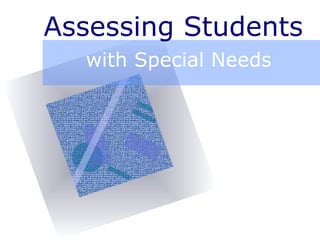
Informal Classroom Assessment
- 1. Assessing Students with Special Needs
- 9. Fine Motor Writing Skills Dev Age Description Pre Post 36 Copies Circle 48 Copies Cross 54 Copies Square 54 Copies simple words (cat) 60 Copies Triangle 72 Copies Diamond 72 Copies letters b, d, p, g
- 10. “ One test of the correctness of an educational procedure is the happiness of the child.” Maria Montessori (Italian Physician and Educator. 1870-1952)
- 17. Informal Assessment Time Requirements Reliability Validity In Preparation Low High High In Class Low In Analysis Low
- 18. Informal Assessment Time Requirements Reliability Validity In Preparation High High High In Class High In Analysis High
- 20. Checklists of Reading Skills
- 21. Diagnostic Checklist of Oral Reading Student _________________ Teacher ______________ Grade Level of Passage _____ Date ______________ Oral Reading Observations Comments 1 2 3 1. Reads expressively 2. Reads clearly (pronunciation) 3. Reads at an appropriate rate 4. Reads for meaning 5. Observes punctuation 6. Not easily frustrated 7. Attempts unfamiliar words 8. Uses morphological skills 9. Uses context clues 10. Displays good comprehension 11. Other notable behaviors (specify)
- 22. Diagnostic Checklist of Silent Reading Student ___________________ Teacher ______________ Grade Level of Passage _______ Date ______________ Silent Reading Observations Comments 1 2 3 1. Points to individual words 2. Runs a finger under each line 3. Runs a finger down the page 4. Whispers words 5. Says words aloud 6. Moves head while reading 7. Holds book too close 8. Holds book too far away 9. Reads too slowly 10. Reads too quickly 11. Other notable behaviors (specify)
- 23. Diagnostic Checklist of Reading Comprehension Student ___________________ Teacher _____________ Grade Level of Passage _______ Date ________________ Reading Comprehension Observations Comments 1 2 3 1. Answers factual questions about the passage 2. Classifies, categorizes, & summarizes the passage 3. Makes inferences & predictions based on the passage 4. Answers valuative questions about the passage 5. Critically analyzes the passage 6. Other notable behaviors (specify)
- 25. ADHD Symptoms Symptoms of Inattention Symptoms of Hyperactivity Fidgets with hands or feet or squirms in seat Leaves seat in classroom in which remaining seated is expected Runs about or climbs too much in inappropriate situations Has difficulty playing quietly Is 'on the go' or acts as if 'driven by a motor' Talks too much Symptoms of Impulsivity Blurts out answers before questions have been completed Has difficulty waiting his or her turn Interrupts or intrudes on others (such as butting into conversations )
- 26. Symptoms of Hyperactivity Behavior Yes No Fidgets with hands or feet or squirms in seat Leaves seat in classroom in situations in which remaining seated is expected Runs about or climbs too much in inappropriate situations Has difficulty playing quietly Is 'on the go' or acts as if 'driven by a motor' Talks too much
- 27. Symptoms of Hyperactivity Behavior Never Some times Often Very Often Fidgets with hands or feet or squirms in seat Leaves seat in classroom in situations in which remaining seated is expected Runs about or climbs too much in inappropriate situations Has difficulty playing quietly Is 'on the go' or acts as if 'driven by a motor' Talks too much
- 28. Symptoms of Hyperactivity Behavior Observ 1 Observ 2 Observ 3 Observ 4 Fidgets with hands or feet or squirms in seat Leaves seat in classroom in situations in which remaining seated is expected Runs about or climbs too much in inappropriate situations Has difficulty playing quietly Is 'on the go' or acts as if 'driven by a motor' Talks too much
- 29. Autism Spectrum Disorders Impaired ability to make friends with peers Impaired ability to initiate or sustain a conversation with others Absence or impairment of imaginative and social play Stereotyped, repetitive, or unusual use of language Restricted patterns of interest (abnormal in intensity or focus) Preoccupation with certain objects or subjects Inflexible adherence to specific routines or rituals
- 30. Teacher Parent Assistant Impaired ability to make friends with peers Impaired ability to initiate or sustain a conversation with others Absence or impairment of imaginative and social play Stereotyped, repetitive, or unusual use of language Restricted patterns of interest (abnormal in intensity or focus) Preoccupation with certain objects or subjects Inflexible adherence to specific routines or rituals
- 38. First Grade Word-Identification Fluency two for come because last from ... Teacher: Read these words . Time: 1 minute.
- 40. Sarah’s Progress on Words Read Correctly Words Read Correctly Sarah Smith Reading Fluency Sep Oct Nov Dec Jan Feb Mar Apr May
- 41. Jessica’s Progress on Words Read Correctly Words Read Correctly Jessica Jones Reading Fluency Sep Oct Nov Dec Jan Feb Mar Apr May
- 43. Jessica’s Progress with Tutoring Words Read Correctly Jessica Jones Reading Fluency Sep Oct Nov Dec Jan Feb Mar Apr May
- 44. Johnathon’s Progress on Words Read Correctly Words Read Correctly Jessica Jones Reading Fluency Sep Oct Nov Dec Jan Feb Mar Apr May
- 45. “ Identification models that include RTI will lead to better achievement and behavior outcomes for students with LD and those at risk for LD.” Lynne and Doug Fuchs, Peabody College of Vanderbilt University
- 46. Informal Assessment Assessing Young Children Checklists – My favorite Curriculum-Based Measurement – identify students with learning disabilities by measuring response to instruction
- 47. Assessing Students with Special Needs
